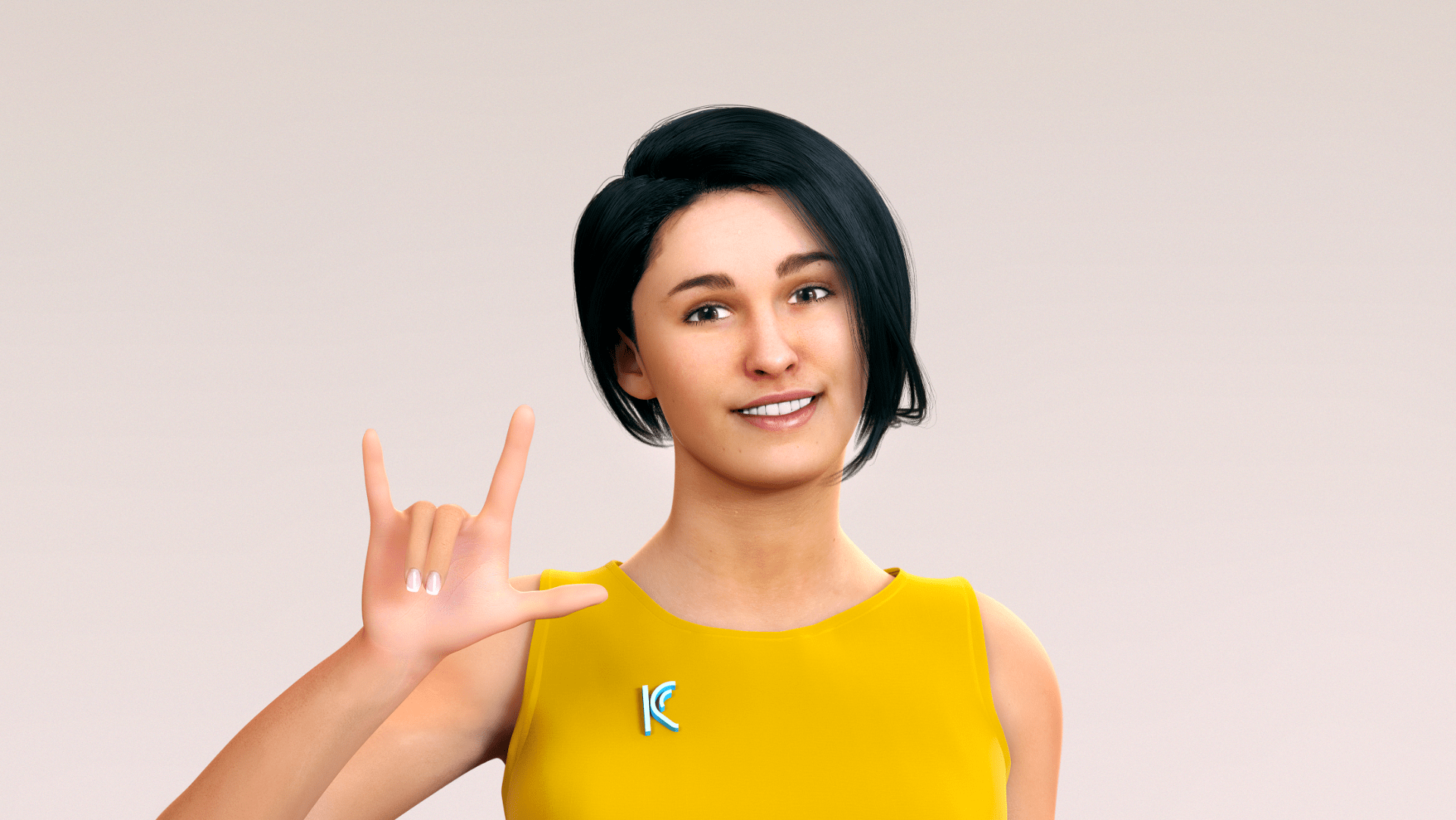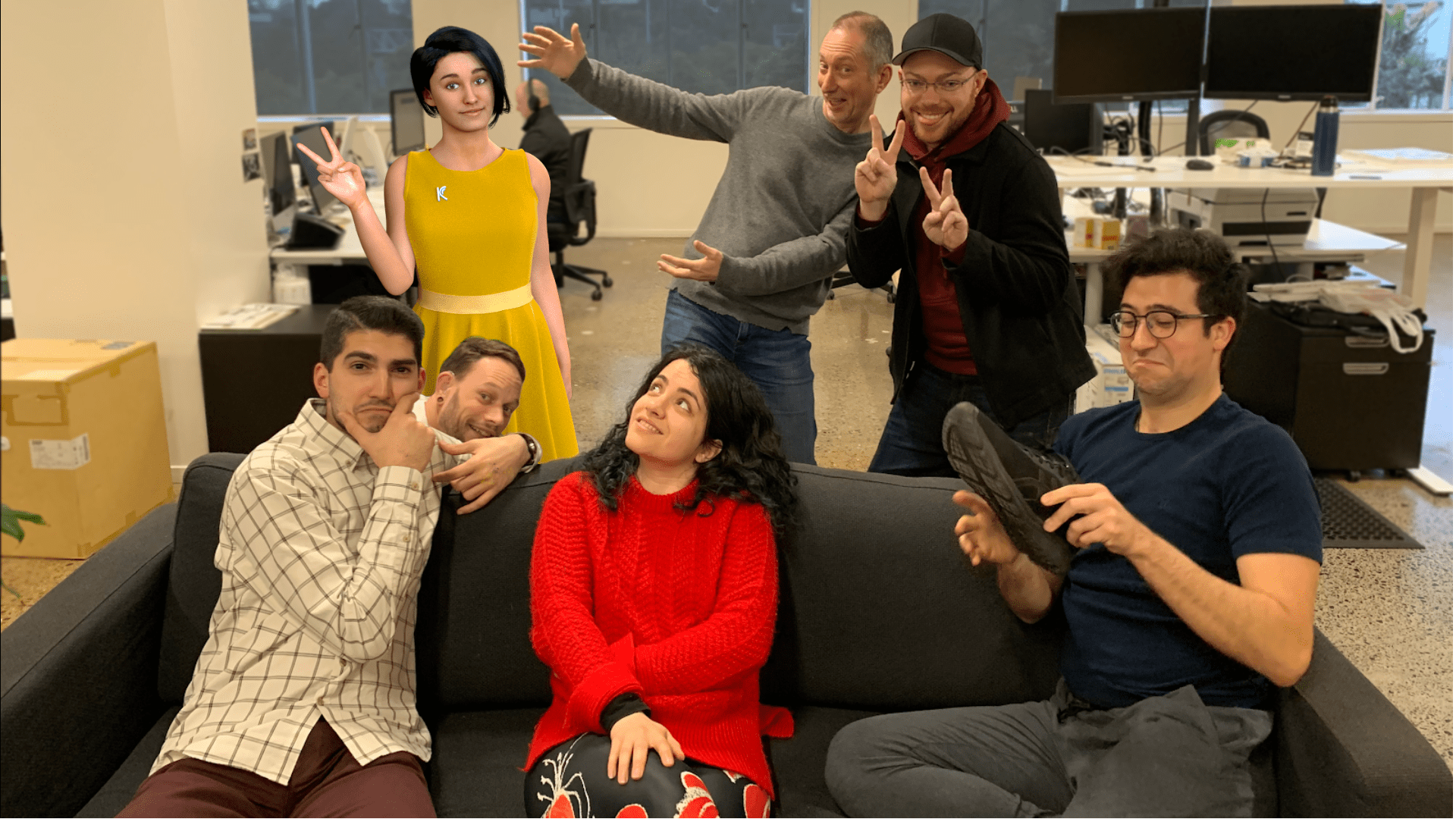NEWSROOM
A sign of the times: Kara technologies innovates to increase accessibility for sign languages
18 November 2020
Kara Technologies co-founder and CEO Arash Tayebi has just been recognised in the 2020 Meaningful Business 100, an award celebrating business leaders around the world combining profit and purpose to help achieve the United Nations Sustainable Development Goals; (4) Quality Education and (10) Reducing Inequality.
Kara’s hyper-realistic sign language avatars are being designed as a complementary digital offering that can be applied in creative and fun settings as well as practical and informative ways. The use of the avatar is not designed to be a replacement to sign language interpreters, but fill a void.
Arash says up to 90% of deaf kids globally don’t have an education, which is particularly prevalent in the developing world, and that’s unacceptable. Kara want to change the world, one hurdle at a time. Arash is on a mission to help deaf children achieve their goals and dreams, whatever they may be; become a doctor, to be a pilot, to be a police officer etc. In order to achieve this, Arash understands we need to ensure they have equitable access to education, in their first language. This is why Arash and his team is focusing on translating stories into sign languages. “It is a proud achievement of mine to show Niki to deaf kids in New Zealand schools and seeing their reactions to what we’ve done.
“We created a collaborative pilot with Deaf Education to translate four children’s books to see whether the deaf children would be engaged with their reading, and whether they could follow/understand the contents of the stories being signed. After showing the books to the students, I asked ‘what should we do next?’ – They were so excited and they ran around their classroom and came back with armfuls of books!”
This year, on top of developing stories, Kara developed an online COVID19 self-checker – Karaselfcheck. This was based on the CDC model. This enabled an increased accessibility for the Deaf and hard of hearing communities in New Zealand by using New Zealand Sign Language (NZSL). “That showed us that there are opportunities for Kara technologies to contribute to the accessibility of public health information, which is really important” says Arash.
The diversity and enormity of opportunities for Kara Technologies is also one of its biggest challenges. Arash explains that the founding team’s passion needs channelling into a ‘laser focus’, and that’s where the ‘grey hairs’ of people with more business experience have proven instrumental in keeping them on a roadmap to take their technology into the market.
Kara Technologies launched in December 2017, after winning a major prize in the Velocity $100k Challenge, a venture development competition run by the University of Auckland Business School’s Centre for Innovation and Entrepreneurship. Their win enabled the team to participate in the University’s first incubator programme – VentureLab.
Through VentureLab, the University’s commercialisation company UniServices came on board as a high-tech research-oriented start-up specialist with the knowledge, connections and investment through the University of Auckland Inventors’ Fund that supported Arash and the Kara team to have the confidence to move forward in the market.
“Without UniServices and VentureLab, there is no Kara. Before Kara Technologies, I never had any experience in running a business but now I have the confidence and advisors around me to keep moving forward with our technology roadmap and expand our business.”
Arash says there are exciting projects in the pipeline which are being co-designed to carefully meet the needs of the Deaf community, while also innovating with new ways of presenting information using the Kara Technology.
To see Kara’s range of avatar-translated books in action, visit https://www.kara.tech/library – the password is stayathome.
Original article by UniServices, republished with permission.




18 November 2020
Kara Technologies co-founder and CEO Arash Tayebi has just been recognised in the 2020 Meaningful Business 100, an award celebrating business leaders around the world combining profit and purpose to help achieve the United Nations Sustainable Development Goals; (4) Quality Education and (10) Reducing Inequality.
Kara’s hyper-realistic sign language avatars are being designed as a complementary digital offering that can be applied in creative and fun settings as well as practical and informative ways. The use of the avatar is not designed to be a replacement to sign language interpreters, but fill a void.
Arash says up to 90% of deaf kids globally don’t have an education, which is particularly prevalent in the developing world, and that’s unacceptable. Kara want to change the world, one hurdle at a time. Arash is on a mission to help deaf children achieve their goals and dreams, whatever they may be; become a doctor, to be a pilot, to be a police officer etc. In order to achieve this, Arash understands we need to ensure they have equitable access to education, in their first language. This is why Arash and his team is focusing on translating stories into sign languages. “It is a proud achievement of mine to show Niki to deaf kids in New Zealand schools and seeing their reactions to what we’ve done.
“We created a collaborative pilot with Deaf Education to translate four children’s books to see whether the deaf children would be engaged with their reading, and whether they could follow/understand the contents of the stories being signed. After showing the books to the students, I asked ‘what should we do next?’ – They were so excited and they ran around their classroom and came back with armfuls of books!”
This year, on top of developing stories, Kara developed an online COVID19 self-checker – Karaselfcheck. This was based on the CDC model. This enabled an increased accessibility for the Deaf and hard of hearing communities in New Zealand by using New Zealand Sign Language (NZSL). “That showed us that there are opportunities for Kara technologies to contribute to the accessibility of public health information, which is really important” says Arash.
The diversity and enormity of opportunities for Kara Technologies is also one of its biggest challenges. Arash explains that the founding team’s passion needs channelling into a ‘laser focus’, and that’s where the ‘grey hairs’ of people with more business experience have proven instrumental in keeping them on a roadmap to take their technology into the market.
Kara Technologies launched in December 2017, after winning a major prize in the Velocity $100k Challenge, a venture development competition run by the University of Auckland Business School’s Centre for Innovation and Entrepreneurship. Their win enabled the team to participate in the University’s first incubator programme – VentureLab.
Through VentureLab, the University’s commercialisation company UniServices came on board as a high-tech research-oriented start-up specialist with the knowledge, connections and investment through the University of Auckland Inventors’ Fund that supported Arash and the Kara team to have the confidence to move forward in the market.
“Without UniServices and VentureLab, there is no Kara. Before Kara Technologies, I never had any experience in running a business but now I have the confidence and advisors around me to keep moving forward with our technology roadmap and expand our business.”
Arash says there are exciting projects in the pipeline which are being co-designed to carefully meet the needs of the Deaf community, while also innovating with new ways of presenting information using the Kara Technology.
To see Kara’s range of avatar-translated books in action, visit https://www.kara.tech/library – the password is stayathome.
Original article by UniServices, republished with permission.
EMAIL
CIE@AUCKLAND.AC.NZ
POSTAL ADDRESS
THE UNIVERSITY OF AUCKLAND BUSINESS SCHOOL
PRIVATE BAG 92019, AUCKLAND














